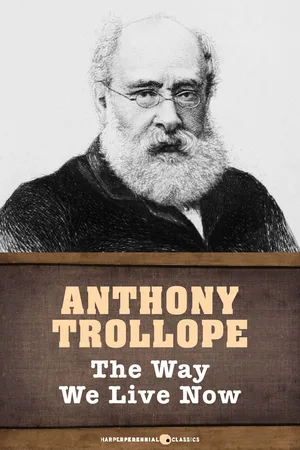
- 1,024 pages
- English
- ePUB (mobile friendly)
- Available on iOS & Android
About this book
The Way We Live Now is the story of foreign-born financier Augustus Melmotte, a man with a mysterious past who sets the rumour mill on fire upon his arrival in London with his family. Using nothing but his charm, Melmotte convinces several associates to invest in his company. But Melmotte's ascent up the social ladder is blocked by Paul Montague, a young engineer who questions his intentions.
A literary classic, The Way We Live Now was inspired by the English financial scandals of the 1870s, and is a stunning, satirical look at an era dominated by greed and dishonesty. The Way We Live Now has twice been adapted for television.
HarperPerennial Classics brings great works of literature to life in digital format, upholding the highest standards in ebook production and celebrating reading in all its forms. Look for more titles in the HarperPerennial Classics collection to build your digital library.
Tools to learn more effectively

Saving Books

Keyword Search

Annotating Text

Listen to it instead
Information
Chapter I
Three Editors
Table of contents
- CONTENTS
- Chapter I—Three Editors
- Chapter II—The Carbury Family
- Chapter III—The Beargarden
- Chapter IV—Madame Melmotte’s Ball
- Chapter V—After the Ball
- Chapter VI—Roger Carbury and Paul Montague
- Chapter VII—Mentor
- Chapter VIII—Lovesick
- Chapter IX—The Great Railway to Vera Cruz
- Chapter X—Mr. Fisker’s Success
- Chapter XI—Lady Carbury at Home
- Chapter XII—Sir Felix in His Mother’s House
- Chapter XIII—The Longestaffes
- Chapter XIV—Carbury Manor
- Chapter XV—“You Should Remember That I Am His Mother”
- Chapter XVI—The Bishop and the Priest
- Chapter XVII—Marie Melmotte Hears a Love Tale
- Chapter XVIII—Ruby Ruggles Hears a Love Tale
- Chapter XIX—Hetta Carbury Hears a Love Tale
- Chapter XX—Lady Pomona’s Dinner Party
- Chapter XXI—Everybody Goes to Them
- Chapter XXII—Lord Nidderdale’s Morality
- Chapter XXIII—“Yes;—I’m a Baronet”
- Chapter XXIV—Miles Grendall’s Triumph
- Chapter XXV—In Grosvenor Square
- Chapter XXVI—Mrs. Hurtle
- Chapter XXVII—Mrs. Hurtle Goes to the Play
- Chapter XXVIII—Dolly Longestaffe Goes into the City
- Chapter XXIX—Miss Melmotte’s Courage
- Chapter XXX—Mr. Melmotte’s Promise
- Chapter XXXI—Mr. Broune Has Made Up His Mind
- Chapter XXXII—Lady Monogram
- Chapter XXXIII—John Crumb
- Chapter XXXIV—Ruby Ruggles Obeys Her Grandfather
- Chapter XXXV—Melmotte’s Glory
- Chapter XXXVI—Mr. Broune’s Perils
- Chapter XXXVII—The Boardroom
- Chapter XXXVIII—Paul Montague’s Troubles
- Chapter XXXIX—“I Do Love Him”
- Chapter XL—Unanimity Is the Very Soul of These Things
- Chapter XLI—All Prepared
- Chapter XLII—Can You Be Ready in Ten Minutes?
- Chapter XLIII—The City Road
- Chapter XLIV—The Coming Election
- Chapter XLV—Mr. Melmotte Is Pressed for Time
- Chapter XLVI—Roger Carbury and His Two Friends
- Chapter XLVII—Mrs. Hurtle at Lowestoft
- Chapter XLVIII—Ruby a Prisoner
- Chapter XLIX—Sir Felix Makes Himself Ready
- Chapter L—The Journey to Liverpool
- Chapter LI—Which Shall It Be?
- Chapter LII—The Results of Love and Wine
- Chapter LIII—A Day in the City
- Chapter LIV—The India Office
- Chapter LV—Clerical Charities
- Chapter LVI—Father Barham Visits London
- Chapter LVII—Lord Nidderdale Tries His Hand Again
- Chapter LVIII—Mr. Squercum Is Employed
- Chapter LIX—The Dinner
- Chapter LX—Miss Longestaffe’s Lover
- Chapter LXI—Lady Monogram Prepares for the Party
- Chapter LXII—The Party
- Chapter LXIII—Mr. Melmotte on the Day of the Election
- Chapter LXIV—The Election
- Chapter LXV—Miss Longestaffe Writes Home
- Chapter LXVI—So Shall Be My Enmity
- Chapter LXVII—Sir Felix Protects His Sister
- Chapter LXVIII—Miss Melmotte Declares Her Purpose
- Chapter LXIX—Melmotte in Parliament
- Chapter LXX—Sir Felix Meddles with Many Matters
- Chapter LXXI—John Crumb Falls into Trouble
- Chapter LXXII—“Ask Himself”
- Chapter LXXIII—Marie’s Fortune
- Chapter LXXIV—Melmotte Makes a Friend
- Chapter LXXV—In Bruton Street
- Chapter LXXVI—Hetta and Her Lover
- Chapter LXXVII—Another Scene in Bruton Street
- Chapter LXXVIII—Miss Longestaffe Again at Caversham
- Chapter LXXIX—The Brehgert Correspondence
- Chapter LXXX—Ruby Prepares for Service
- Chapter LXXXI—Mr. Cohenlupe Leaves London
- Chapter LXXXII—Marie’s Perseverance
- Chapter LXXXIII—Melmotte Again at the House
- Chapter LXXXIV—Paul Montague’s Vindication
- Chapter LXXXV—Breakfast in Berkeley Square
- Chapter LXXXVI—The Meeting in Bruton Street
- Chapter LXXXVII—Down At Carbury
- Chapter LXXXVIII—The Inquest
- Chapter LXXXIX—“The Wheel of Fortune”
- Chapter XC—Hetta’s Sorrow
- Chapter XCI—The Rivals
- Chapter XCII—Hamilton K. Fisker Again
- Chapter XCIII—A True Lover
- Chapter XCIV—John Crumb’s Victory
- Chapter XCV—The Longestaffe Marriages
- Chapter XCVI—Where “The Wild Asses Quench Their Thirst”
- Chapter XCVII—Mrs. Hurtle’s Fate
- Chapter XCVIII—Marie Melmotte’s Fate
- Chapter XCIX—Lady Carbury and Mr. Broune
- Chapter C—Down in Suffolk
- About the Author
- About the Series
- Copyright
- About the Publisher
Frequently asked questions
- Essential is ideal for learners and professionals who enjoy exploring a wide range of subjects. Access the Essential Library with 800,000+ trusted titles and best-sellers across business, personal growth, and the humanities. Includes unlimited reading time and Standard Read Aloud voice.
- Complete: Perfect for advanced learners and researchers needing full, unrestricted access. Unlock 1.4M+ books across hundreds of subjects, including academic and specialized titles. The Complete Plan also includes advanced features like Premium Read Aloud and Research Assistant.
Please note we cannot support devices running on iOS 13 and Android 7 or earlier. Learn more about using the app